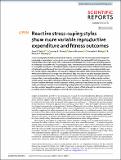Files in this item
Reactive stress-coping styles show more variable reproductive expenditure and fitness outcomes
Item metadata
| dc.contributor.author | Twiss, Sean | |
| dc.contributor.author | Schuert, Courtney | |
| dc.contributor.author | Brannan, Naomi | |
| dc.contributor.author | Bishop, Amanda | |
| dc.contributor.author | Pomeroy, Patrick | |
| dc.date.accessioned | 2020-06-22T12:30:02Z | |
| dc.date.available | 2020-06-22T12:30:02Z | |
| dc.date.issued | 2020-06-12 | |
| dc.identifier | 258343988 | |
| dc.identifier | 6f52e2a0-4b9d-4899-8741-3c1431d3ed5c | |
| dc.identifier | 85086371390 | |
| dc.identifier | 000543969200031 | |
| dc.identifier.citation | Twiss , S , Schuert , C , Brannan , N , Bishop , A & Pomeroy , P 2020 , ' Reactive stress-coping styles show more variable reproductive expenditure and fitness outcomes ' , Scientific Reports , vol. 10 , 9550 . https://doi.org/10.1038/s41598-020-66597-3 | en |
| dc.identifier.issn | 2045-2322 | |
| dc.identifier.other | ORCID: /0000-0003-1603-5630/work/76386566 | |
| dc.identifier.uri | https://hdl.handle.net/10023/20119 | |
| dc.description | Funding: Support for the initial development and deployment of HR monitors during 2013 and 2014 field campaigns was provided to SDT by the National Geographic Society Waitt Grants Program (Grant Number W287-13). UK NERC supported long term research at the Isle of May through core funding to SMRU. PPP was in receipt of NERC grant no. NE/G008930/1 and Esmée Fairbairn Foundation funding during the work. AMB and CRS were supported by the Durham Doctoral Studentship scheme. | en |
| dc.description.abstract | Stress-coping styles dictate how individuals react to stimuli and can be measured by the integrative physiological parameter of resting heart-rate variability (HRV); low resting HRV indicating proactive coping styles, while high resting HRV typifies reactive individuals. Over 5 successive breeding seasons we measured resting HRV of 57 lactating grey seals. Mothers showed consistent individual differences in resting HRV across years. We asked whether proactive and reactive mothers differed in their patterns of maternal expenditure and short-term fitness outcomes within seasons, using maternal daily mass loss rate to indicate expenditure, and pup daily mass gain to indicate within season fitness outcomes. We found no difference in average rates of maternal daily mass loss or pup daily mass gain between proactive and reactive mothers. However, reactive mothers deviated more from the sample mean for maternal daily mass and pup daily mass gain than proactive mothers. Thus, while proactive mothers exhibit average expenditure strategies with average outcomes, expenditure varies much more among reactive mothers with more variable outcomes. Overall, however, mean fitness was equal across coping styles, providing a mechanism for maintaining coping style diversity within populations. Variability in reactive mothers’ expenditures and success is likely a product of their attempts to match phenotype to prevailing environmental conditions, achieved with varying degrees of success. | |
| dc.format.extent | 12 | |
| dc.format.extent | 1771323 | |
| dc.language.iso | eng | |
| dc.relation.ispartof | Scientific Reports | en |
| dc.subject | GC Oceanography | en |
| dc.subject | QH301 Biology | en |
| dc.subject | DAS | en |
| dc.subject.lcc | GC | en |
| dc.subject.lcc | QH301 | en |
| dc.title | Reactive stress-coping styles show more variable reproductive expenditure and fitness outcomes | en |
| dc.type | Journal article | en |
| dc.contributor.sponsor | NERC | en |
| dc.contributor.sponsor | NERC | en |
| dc.contributor.institution | University of St Andrews. School of Biology | en |
| dc.contributor.institution | University of St Andrews. Sea Mammal Research Unit | en |
| dc.contributor.institution | University of St Andrews. Marine Alliance for Science & Technology Scotland | en |
| dc.contributor.institution | University of St Andrews. Scottish Oceans Institute | en |
| dc.contributor.institution | University of St Andrews. Centre for Research into Ecological & Environmental Modelling | en |
| dc.identifier.doi | 10.1038/s41598-020-66597-3 | |
| dc.description.status | Peer reviewed | en |
| dc.identifier.grantnumber | Agreement R8-H12-86 | en |
| dc.identifier.grantnumber | NE/G008930/1 | en |
This item appears in the following Collection(s)
Items in the St Andrews Research Repository are protected by copyright, with all rights reserved, unless otherwise indicated.

